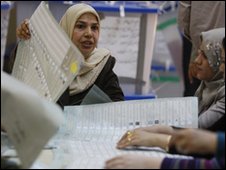 Partial results for Iraq's elections show Prime Minister Nouri Maliki's coalition ahead in the crucial area of Baghdad, election officials say.
Partial results for Iraq's elections show Prime Minister Nouri Maliki's coalition ahead in the crucial area of Baghdad, election officials say.Results from across the country suggest a tight contest may be developing between Mr Maliki and his main rival, former Prime Minister Iyad Allawi.
Baghdad has 70 seats in the 325-member parliament, making results there key.
There have been complaints about the slow pace of the count for the 7 March polls, and some claims of fraud.
Final results for all 18 provinces are not expected for a fortnight, after which there is expected to be a long process of coalition-building.
Major prize
The election commission released its preliminary figures for Baghdad on Saturday, saying about 18% of the vote had been counted.
The results showed that Mr Maliki's State of Law, a coalition which purportedly cuts across religious and tribal lines, was leading the mainly-Shia Iraqi National Alliance by some 50,000 votes.
Former PM Iyad Allawi's secular Iraqiya bloc was in third place.
Winning Baghdad - which provides more seats to the Iraqi parliament than any other constituency - could give a major boost to Mr Maliki's chances to retain the prime minister's office.
On Friday, the commission said Mr Maliki's bloc was leading in two Shia provinces south of Baghdad.
It said Mr Maliki's main rival, Iyad Allawi, was ahead in two provinces to the north of the capital.
About 6,200 candidates from 86 factions campaigned for seats in the 325-member parliament.
Analysts say it is unlikely one party will form a government alone and there may be months of negotiations on a coalition.
Voter turnout was 62%, officials said, despite attacks that killed 38 people on Sunday.
It was down on the 75% turnout figure for the 2005 general election.



